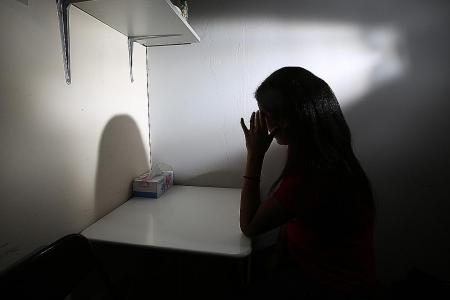More suffering violence at home amid pandemic
Covid-19 has created or worsened tensions at home, say social workers, who are getting more calls for help
She was a professional in her 30s and, for more than five years, endured in silence brutal abuse from her violent husband.
He was controlling, checked her calls and was prone to flying into a rage if he did not get what he wanted.
The mother of two young children did not seek help until he beat her up so badly that she landed in hospital with a blood clot in her shoulder.
The hospital alerted the social workers at Care Corner Project StART.
Care Corner Project StART lead social worker Kristine Lam, who has been working with the woman since 2019, said she had found ways to cope with her husband's controlling and violent streak.
But the pandemic took her to a breaking point.
Ms Lam said: "She felt trapped when her husband started to work from home during the pandemic, and she did not feel safe with him around the clock."
To avoid angering him, she gave in to his wishes and he has not hit her again, as far as Ms Lam is aware.
More people appear to be crying out for help amid the pandemic, going by the number of cases handled by the three community-based centres that specialise in delivering services relating to family violence.
Altogether, Care Corner Project StART, Pave and Trans Safe Centre handled 1,103 new cases in the financial year ending in March, up 14 per cent from the 966 cases in the previous year.
TASK FORCE
There were 891 cases in the year before that, according to a report released by the Task Force on Family Violence on Sept 23.
Law and Home Affairs Minister K. Shanmugam, in a parliamentary reply last Monday, said there were 5,134 police reports last year linked to family violence.
A greater awareness of family violence and more victims being more open to getting help is one reason for the rise, said social workers.
And the pandemic has created or worsened tensions due to job or income losses, worsening caregiving stresses and work and study from home arrangements.
Trans Safe Centre director Cherylene Aw said: "The pandemic amplified the deep-seated, chronic challenges that families were already experiencing."
Social workers say victims are under more duress if the couple both work from home, given the continual threat of abuse.
It is also harder for them to seek help without the abuser knowing.
Ms Lam said: "One woman told me she is more fearful of staying at home with her husband than she is of the virus."
One example is Debra (not her real name), whose husband falsely accused her of having an affair, stalked her and spread malicious lies about her to her relatives. It got to a point where she contemplated suicide.
She eventually called Pave for help and sought refuge at a shelter.
A Ministry of Social and Family Development (MSF) spokesman said the common types of family violence seen at the Family Violence Specialist Centres are spousal abuse, which comprised 45 per cent of cases, and child abuse, which made up 22 per cent of cases.
Meanwhile, the National Anti-Violence Helpline received about 3,700 calls in the first six months of this year. The 24-hour helpline started operations in January.
MSF said 60 per cent of calls were people such as family members and neighbours calling to report a case of alleged abuse. The remaining 40 per cent of calls were general inquiries.
Those who need help can call the National Anti-Violence Helpline on 1800-777-0000.
Get The New Paper on your phone with the free TNP app. Download from the Apple App Store or Google Play Store now



